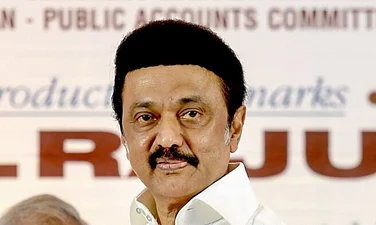The Supreme Court ruling upholding the EC's right to decide when to hold elections in Gujarat has come as a poke in the eye for the pro-Narendra Modi faction in the BJP. Says a cabinet minister, "The Gujarat issue was mishandled right from the start. The presidential reference was an unnecessary exercise foisted on the Supreme Court."
In the nuances of the judgement itself—which underscores the party's loss of morale vis-a-vis Gujarat—the BJP leaders merely evinced academic interest. That the ruling came immediately after its bugbear, Chief Election Commissioner J.M. Lyngdoh, had enhanced his stature by successfully holding a free and fair election in J&K hasn't helped matters.
The BJP seeks comfort in the fact that the apex court turned down the EC's suggestion of President's Rule in Gujarat, thus allowing Modi to continue as caretaker CM until the poll scheduled for December 12. Spokesperson Arun Jaitley pointed out that the ruling "eliminates discretion" in the holding of elections, in that it said polls should be held within six months of the assembly's dissolution.
Responses to the court's ruling have gone by the spirit rather than the letter of the judgement. And that, as constitution expert and former law minister Shanti Bhushan points out, strengthened the EC's hands and therefore, democracy. "Not even Parliament can interfere with the EC," he adds. Supreme Court Bar Association (SCBA) chairman R.K. Jain agrees that the ruling has "unequivocally upheld the EC's powers to decide when elections should be held".
On the other hand, the apex court also ruled that the question of the exercise of Article 356, which deals with the imposition of President's Rule, did not arise. In fact, legal experts say that Congress lawyer Kapil Sibal "scored a self-goal" by getting the apex court to accept the argument that Article 174 did not hold good in the case of a dissolved assembly, thus extending to January 19 the deadline for holding elections and eliminating the possibility of President's Rule. "Certainly, it would have been better if elections were held under President's Rule," agrees Jain.
According to Bhushan, "Jaitley was quite correct in arguing that no more than six months should elapse between two sittings of an assembly. But that does not mean holding elections at all costs, as he suggested. The answer lay in imposing President's Rule until such time as the EC felt elections could be held. This (Modi's) caretaker government is responsible to no one. It's not a democratic government". President's Rule as a way out was exactly what the EC had suggested.
But Sibal confined himself to arguing that Article 174 did not apply to a dead house. Sources said that an informal understanding had been reached between the Opposition parties that they would not press for President's Rule in Gujarat while arguing before the apex court, as that might create a dangerous precedent for the future.
The pmo's stand, which had advised deputy prime minister L.K. Advani against a head-on confrontation with the EC, has been vindicated. But the anti-Modi faction in the party feels Prime Minister Atal Behari Vajpayee should have taken a more assertive stand.
However, as a senior party office-bearer points out, "The PM never interferes with Advaniji's decision on Gujarat and likewise, Advaniji refers to the PM on matters related to UP". It's owing to this division of spheres that the PM has not asserted himself vis-a-vis Modi, who's an Advani man. As for Advani, his propensity for backing "his" people to the hilt is well known. Even in the face of resentment from all quarters, including the hardliners who prefer "assertive" Hindutva to Modi's brand of "aggressive" Hindutva.
Meagre Contentment
The ruling on the reference damages aggressive Hindutva's morale

Meagre Contentment
Meagre Contentment
Published At:
MOST POPULAR
WATCH
MORE FROM THE AUTHOR
PHOTOS
×





















